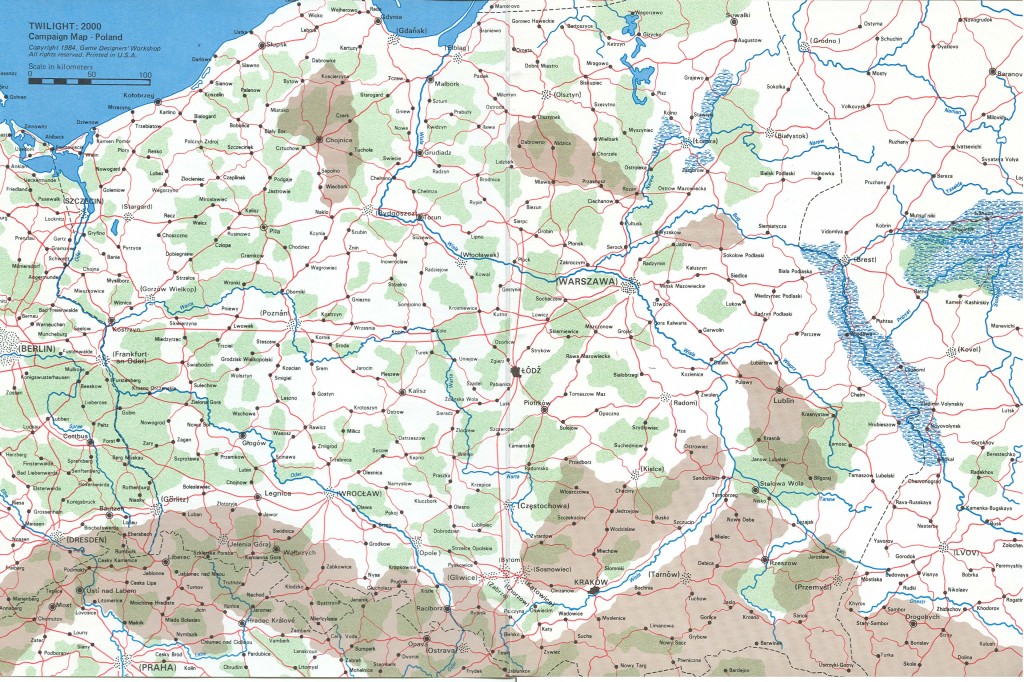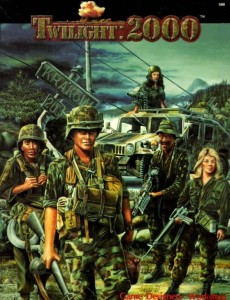It’s the last of the pure reposts! I’m going over the writing prompts from last year, to see if my answers have changed at all. But I’m just doing reposts from my G+ feed for the first three entries as they’re just about the first games I encountered. We’ve already gone over the first game played and first one I GMed.
#RPGaDAY, Last Year: Day 3: What was the first roleplaying game you purchased?
I’m going to skip past D&D because while I know that was the first one played, it was a gift. In those early days, we played a lot of D&D, but branched out and played quite a few other role-playing games like Rolemaster and Champions. I was also big into Car Wars, but… You know, it may have been Autoduel Champions. Or Villains & Vigilantes. Because it was so long ago, I’m not sure who owned what back then. (I recall AD&D books on the shelf, along with some Grimtooth’s Traps books.)
Instead, I’ll jump to when I moved overseas, because that’s when I definitely would have purchased my own stuff.
So Twilight: 2000 it is.

When I picked this up, it was overseas, in West Germany (remember that?). In that game, the war against the Soviet Union went completely tits up with nuclear exchanges and an ongoing ground war, and we, the military kids on a US base, were sure the game was an accurate foretelling of the future.
We only played one session.
But oh, I loved that post-apocalyptic setting!
 Funny story. When I was getting into graphic design in the hobby games industry, I saw that someone had purchased the license for the game and were about to bring it out as Twilight: 2013. I inquired about laying out the book and didn’t get the job. But there was more to it than that.
Funny story. When I was getting into graphic design in the hobby games industry, I saw that someone had purchased the license for the game and were about to bring it out as Twilight: 2013. I inquired about laying out the book and didn’t get the job. But there was more to it than that.
The initial posting about T:2013 seemed to indicate that there was going to be a narrative-heavy “story game†version of play included. I inquired about that in the company’s forum and received a slightly negative reply from another fan of the company who hated, absolutely hated, games where players have any narrative control. No big deal. This Ed person seemed polite in his response, actually. He’s prominent on the message forum, so I look at his profile. Hey, there’s a link for people to come visit his LiveJournal (remember that?). So I do. And that’s where there was a full page of him calling me a “fucking little pansy†for liking games where players could make up things. “Shut the fuck up, bitch.†“Come back to my table when you grow a pair!†It reads like he was skipping out on taking his serious medication. (You can read his bizarre rant at http://ed-t.livejournal.com/61203.html. It’s all the more insane when you realize he’s railing against people being duplicitous in conversations, when his public response to me was rather courteous.) Reading other LJ posts of his reveal him to be a very, very angry person.
Meanwhile, I’m in talks with the two people at the company about layout. We’re sending emails back and forth. Right when I suggest that I actually be compensated for design work, I never hear from them again.
Also about that time, they publicly announce that they brought the angry guy on board.
Anyway, Twilight: 2000. Pretty cool game.




 Contacts.
Contacts.
 Funny story. When I was getting into graphic design in the hobby games industry, I saw that someone had purchased the license for the game and were about to bring it out as Twilight: 2013. I inquired about laying out the book and didn’t get the job. But there was more to it than that.
Funny story. When I was getting into graphic design in the hobby games industry, I saw that someone had purchased the license for the game and were about to bring it out as Twilight: 2013. I inquired about laying out the book and didn’t get the job. But there was more to it than that.